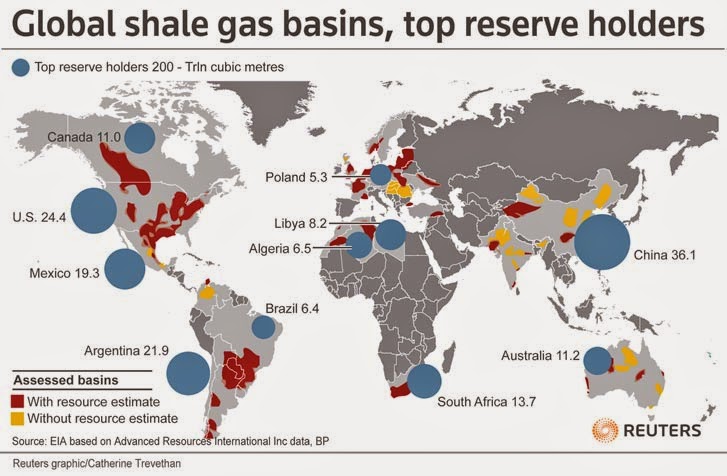 |
| http://money.cnn.com/2013/08/16/news/companies/uk-fracking-protests/ |
Enabling technologies (hydraulic fracturing and horizontal drilling) has opened up new avenues for oil and gas development, with a focus on shale, coal beds and tight sands (EPA, 2014). The process of hydraulic fracturing is used in unconventional natural gas production, with shale gas extraction being a more recent development.
AN INTERACTIVE ANIMATION
>>> http://news.nationalgeographic.com/news/2010/10/101022-breaking-fuel-from-the-rock/ <<<
Hydraulic fracturing: How it works
What do you think of fracking?
'Unconventional' oil and gas production through new technologies aim to unlock oil and gas from geological formations that were previously thought to have been economically unrecoverable (BP, 2014). Global shale gas reserves could be tapped (Figure 1).
 |
| Figure 1. http://www.forbes.com/sites/kenrapoza/2012/02/13/china-closer-to-joining-shale-gas-fracking-craze/ |
Proponents argue that fracking is crucial to global economic stability and economic benefits outweigh environmental risks (Engelder, 2011).
The Exxon Mobil video certainly paints a perfect picture of the technology. They really make it seem quick and easy.
BUT...The technology is far from perfect and there are health and environmental risks (Howarth et al, 2011).
 |
| http://www.nature.com/nature/journal/v477/n7364/full/477271a.html |
There are potential risks of fracking:
- Fracking additives could be toxic (Aldhous, 2012)
- Methane gas emissions (Wigley, 2011)
- Contamination of drinking water: especially groundwater (Gordalla et al, 2013)
- Local air pollution (Brown, 2007)
Fracking is really hyped up in the United States, where shale reserves are high.
Take a look at this Frack Map >>>>> CLICK HERE <<<<<<
However, I think some caution should be made with regards to an over-reliance on forecasts.
This is what some call the 'Fracking Fallacy'. Forecasts can be overly optimistic, since the US is betting on shale gas for it's energy future (Inman, 2014).
It all seems like guess work to me. How can forecasts be made if technological development is uncertain and shale gas reserves differ in geological condition and economic viability of extraction?
http://www.nature.com/news/natural-gas-the-fracking-fallacy-1.16430
Final Remarks:
Fracking is a mad rush for gold and is only a short-term solution to the energy problem. Environmental and health assessments of fracking technologies are lacking. The politics and public feelings towards fracking is not helping the image either.
There is no quick-fix for the energy future. A long-term vision necessitates alternatives. Compared to fracking, nuclear is looking quite attractive.
Aldhous, P. (2012). Drilling into the Unknown. New Scientist, 213(2849), 8-10.
Brown, V. J. (2007). Industry issues: Putting the heat on gas. Environmental health perspectives, 115(2), A76.
Gordalla, B. C., Ewers, U., & Frimmel, F. H. (2013). Hydraulic fracturing: a toxicological threat for groundwater and drinking-water?. Environmental Earth Sciences, 70(8), 3875-3893.
Wigley, T. M. (2011). Coal to gas: the influence of methane leakage. Climatic change, 108(3), 601-608.

No comments:
Post a Comment